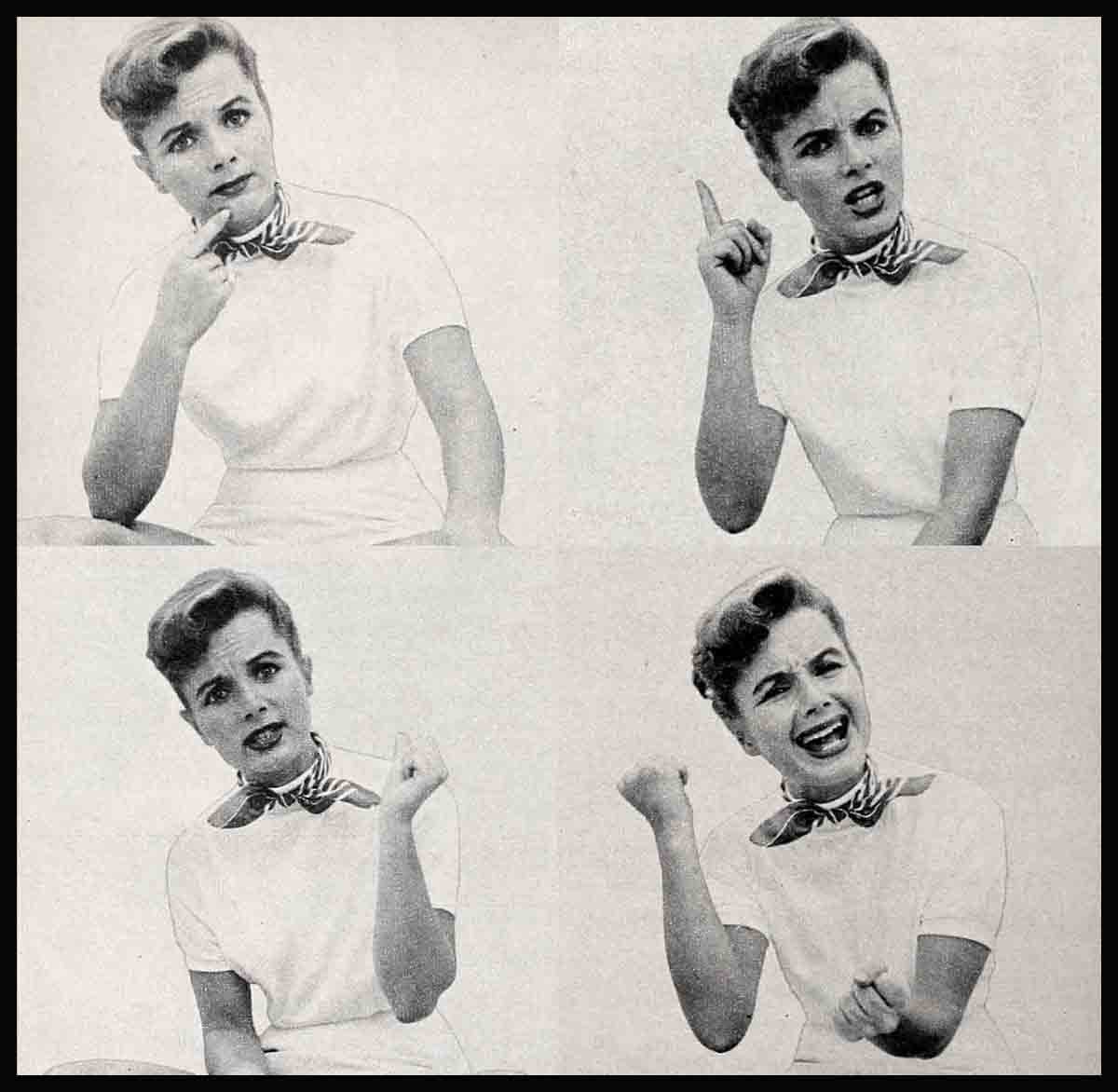
Debbie Reynolds Hopeless
It was a typical Hollywood party—bright lights, bright conversation and people, people everywhere.
A talent scout was holding forth. “Nope,” he said, “it just can’t happen!”
“What can’t?” asked the scenario writer standing beside him.
“This girl Debbie Reynolds—she just can’t make the grade.
“Why not?”
“Because she breaks all the rules! Why, a girl that’s come as far as she has in pictures has gotta have her own apartment. She’s gotta wear dresses cut down to here, date the gay boys around town, teach Dr. Kinsey a thing or two.”
“But?”
“Do I have to tell you? You know about this Reynolds doll. She’s hopeless. Whenever you see a picture of her, she’s climbing a tree or making a fire by rubbing two Girl Scouts together. She’s so wholesome it hurts. Take a look at her. Little Miss Purity!”
And just then Debbie walked toward them across the room.
“Hey, chick,” the scout was beginning to feel his drinks just a little, “that’s a mighty pretty dress you’ve got on. And mighty modest.”
Debbie, who, as usual, had been drinking ginger ale—straight—gave him one of those twinkling smiles. She had an idea what was coming next. And she was right. It came.
“You know, Debbie, you ought to wise up. Give yourself some sex appeal. Get yourself a dress or two that shows the world what you’ve got.”
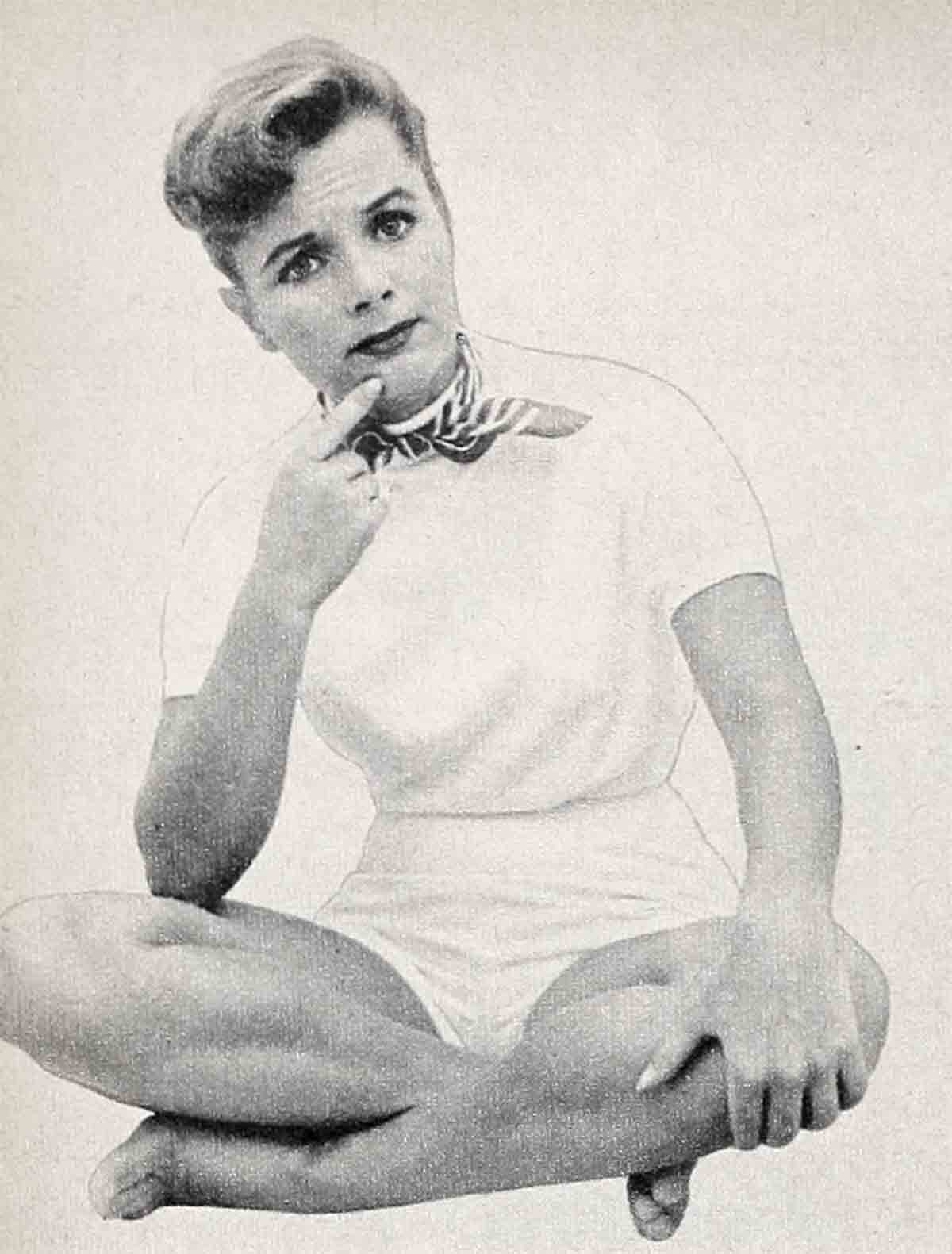
Now Debbie may be modest. But that doesn’t mean she’s shy. When she has something to say, she says it. And she had a great deal to say just then.
“That,” she said, “is not my idea of sex at all. Sex appeal is something inside a person. You either have it or you don’t. And if you do, you don’t have to serve it up on a silver platter. It’s there—and people can recognize it.
“Sure,” the scout broke in. “But you don’t have to make it so darned hard for them to find.”
“If that means posing in the nude, and giving out sexy interviews, you can count me out. If I have to do that to get ahead in the movies, they’re going to have to get a new girl.”
And with that, Debbie bowed out of the tete-a-tete.
That scout was by no means the first person who has tried to convince Debbie that she ought to dress more daringly. In fact, there was a small-size ruckus on that very problem when she was playing in “I Love Melvin.”
In a dream sequence, she was supposed to be decked out as a slinky movie star. And the M-G-M wardrobe department had designed a really low-cut gown for her to wear. They tried it on her and she shuddered.
“Ooh,” she said. “I feel so naked!”
“But,” they insisted, “it’s right for the part.”
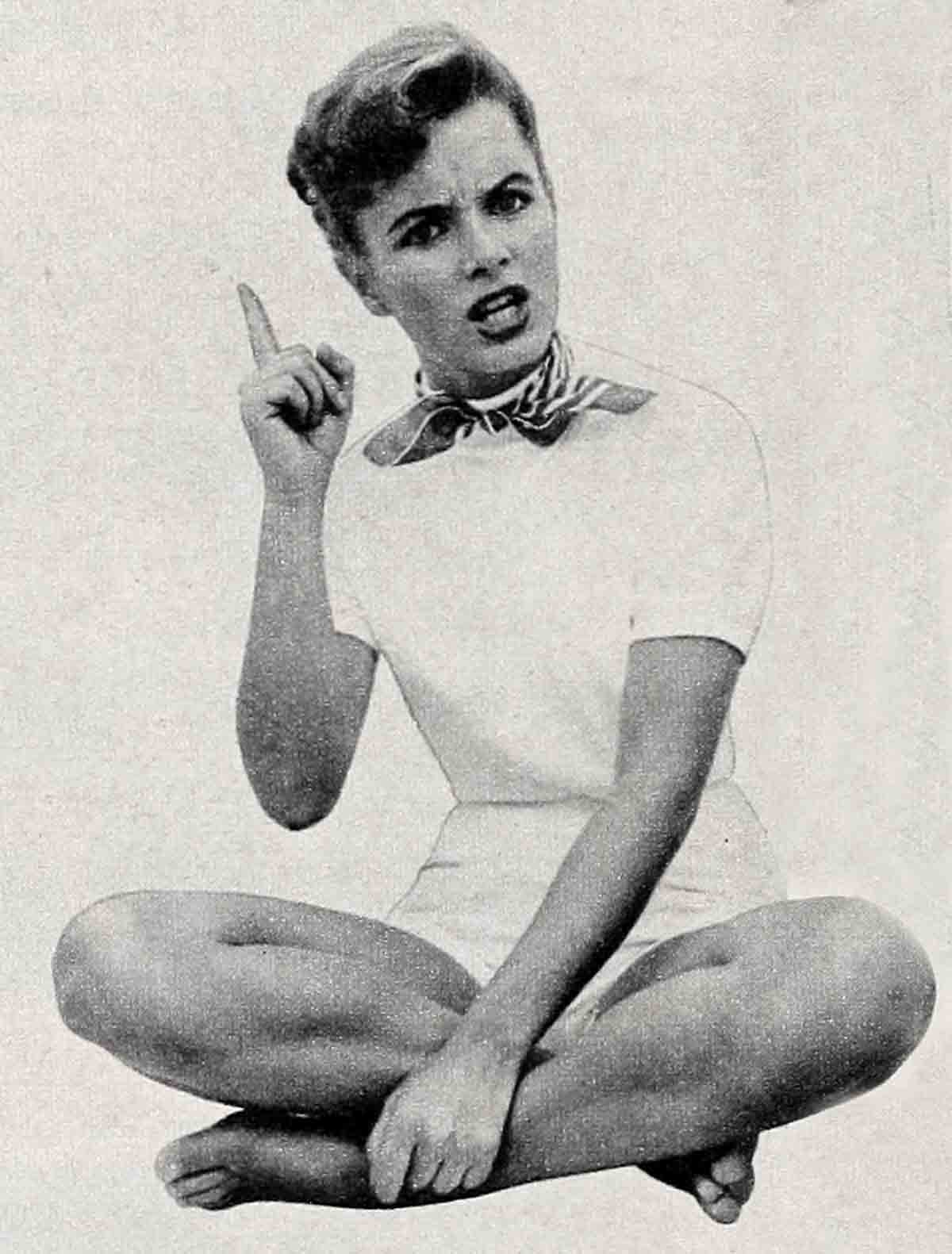
“Maybe,” said Debbie. “But it certainly isn’t right for me.” Finally, over vehement protest, she had them add material—one, two, then three strips—to the neckline. And that was the way she wore it.
Every once in awhile she does get into a low-cut dress—just medium low, that is—and then she’s miserable all evening. She keeps her hands clutched at the neck- line and drives photographers wild.
At a night club once, a photographer was trying to get a glamour-shot of her. Exasperated, he called out, “Take your hands down, Debbie.”
And Debbie, keeping her hands exactly where they were, retorted, “You take care of your pictures. I’ll take care of my dress.”
This simple modesty colors not only Debbie’s clothes style, but everything about her: her conversation, her choice of friends, her ideas of how to have fun.
Take the matter of dating, for instance. Debbie and the young men she goes out with don’t always see eye to eye on what is and what is not proper behavior for young people. One night, she was out with a group of a half dozen or so, and the conversation turned, as it has a way of doing, to sex.
Debbie spoke out strongly, for she has definite opinions on the subject.
Her date gave her a long, cold look and said disgustedly, “Oh Debbie, don’t be such a professional virgin.”
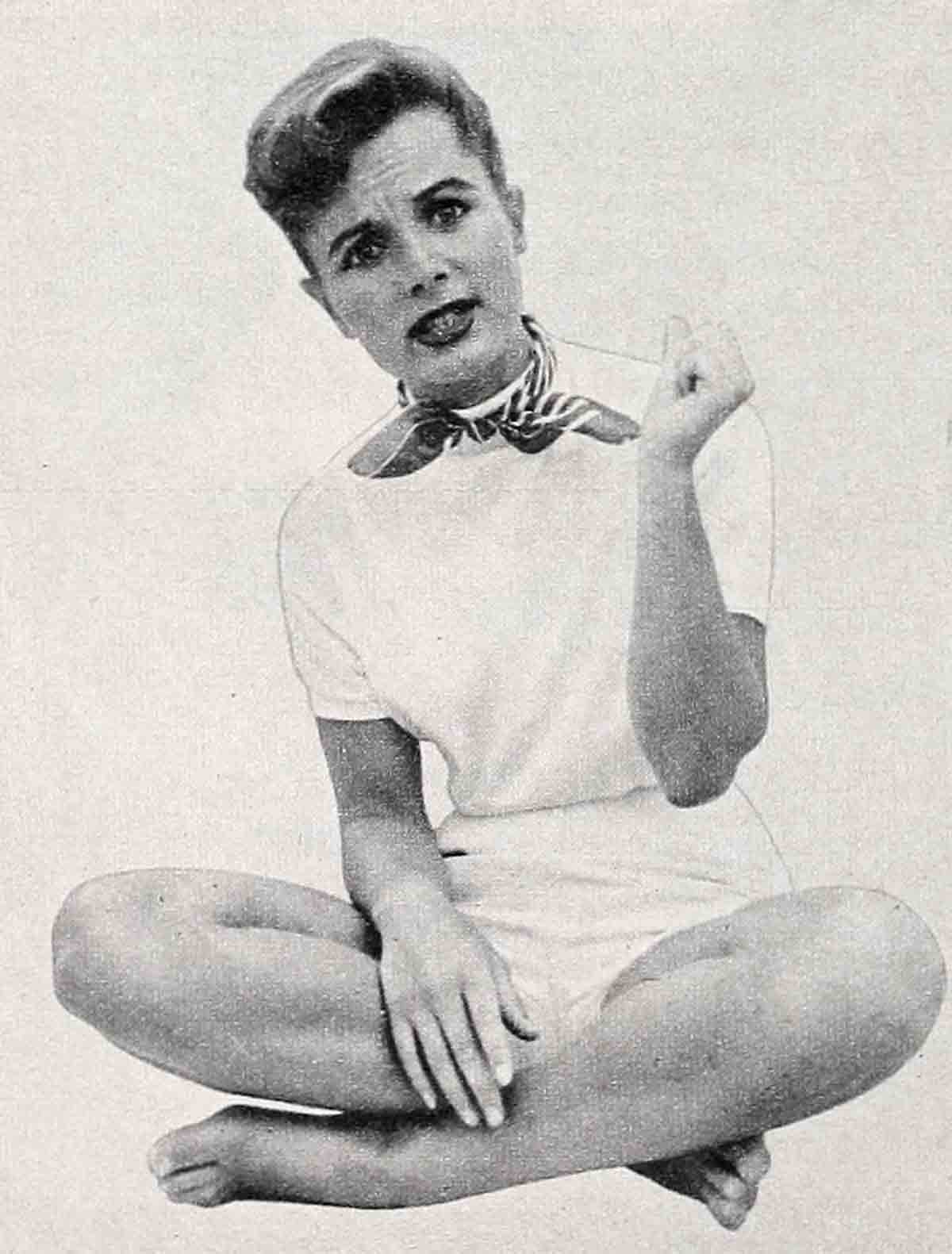
She was so taken aback, she said afterwards, that she didn’t say another word for the rest of the evening. And anyone who knows what a chatter-box she is, can be sure that if she wasn’t talking, she was doing a lot of thinking.
The phrase upset her. But after that night she put it out of her mind and didn’t think about it again until she saw “The Moon Is Blue,” in which the same words are used to the virtuous heroine. “Then I remembered,” recalls Debbie, “and I laughed and laughed and laughed. And what’s more, I knew that I was righter than ever.”
Hollywood wolves just can’t figure Debbie out. Men-about-town though they may be, they invariably get the brush when they call her. She has had to change her telephone number four times because of the persistent baying and howling that comes over her wires, mostly from self-styled smoothies she hasn’t even met. Those conversations usually go something like this:
He: How about going out tonight?
She: I’m very sorry, but I can’t. I don’t even know you.
He: Oh, come now, Debbie, don’t be so formal. That’s an old-fashioned idea.
She: Then I’m just an old-fashioned girl and you wouldn’t be interested in me.
Sound Effect: Receiver banging down!
Which is not to say that Debbie’s not a dating girl. She is one of the most popular in town. But she chooses her escorts carefully. And she has her own system for keeping them in line.
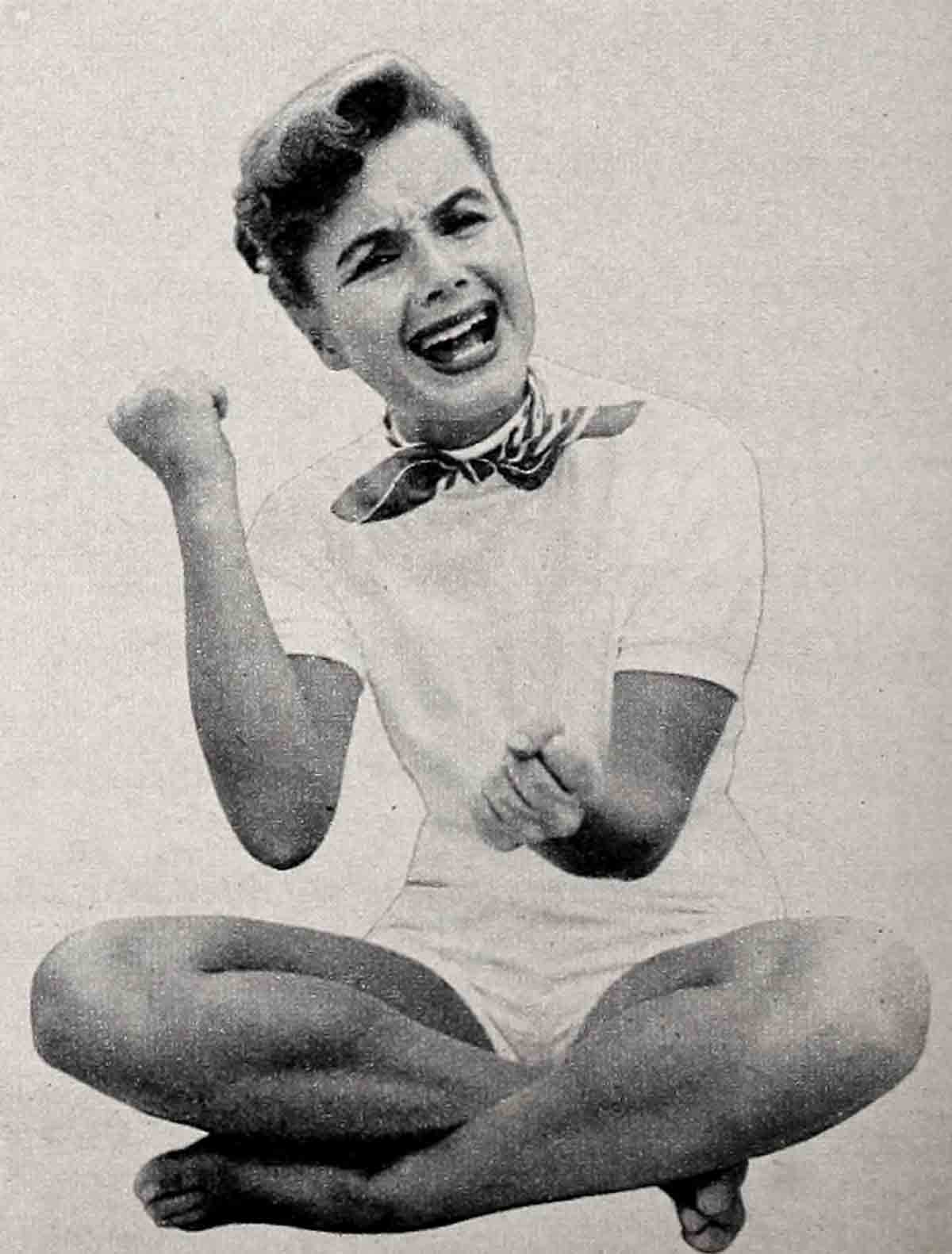
Before she goes out at night she tells her family what boy she’s going out with, where she’ll be and whether she’ll be back early or late. And then she gives them the most important information of all—whether she’d like them to leave the porch light on or off.
She explains simply. “If it’s a boy I don’t mind kissing goodnight, the light is off. Otherwise, it stays on.”
Debbie’s just as afraid of being considered uppity as she is of being thought immodest. And she asks, and gets, cooperation from her friends and family in making sure she doesn’t put on airs.
One day not so long ago, when she came in from the studio, she burbled on happily to her family about the day’s events. She was going a mile a minute, until her mother caught her up short: “Debbie, what is that peculiar way you’re talking? This calling us all ‘dahling’ and ‘deah.’ ”
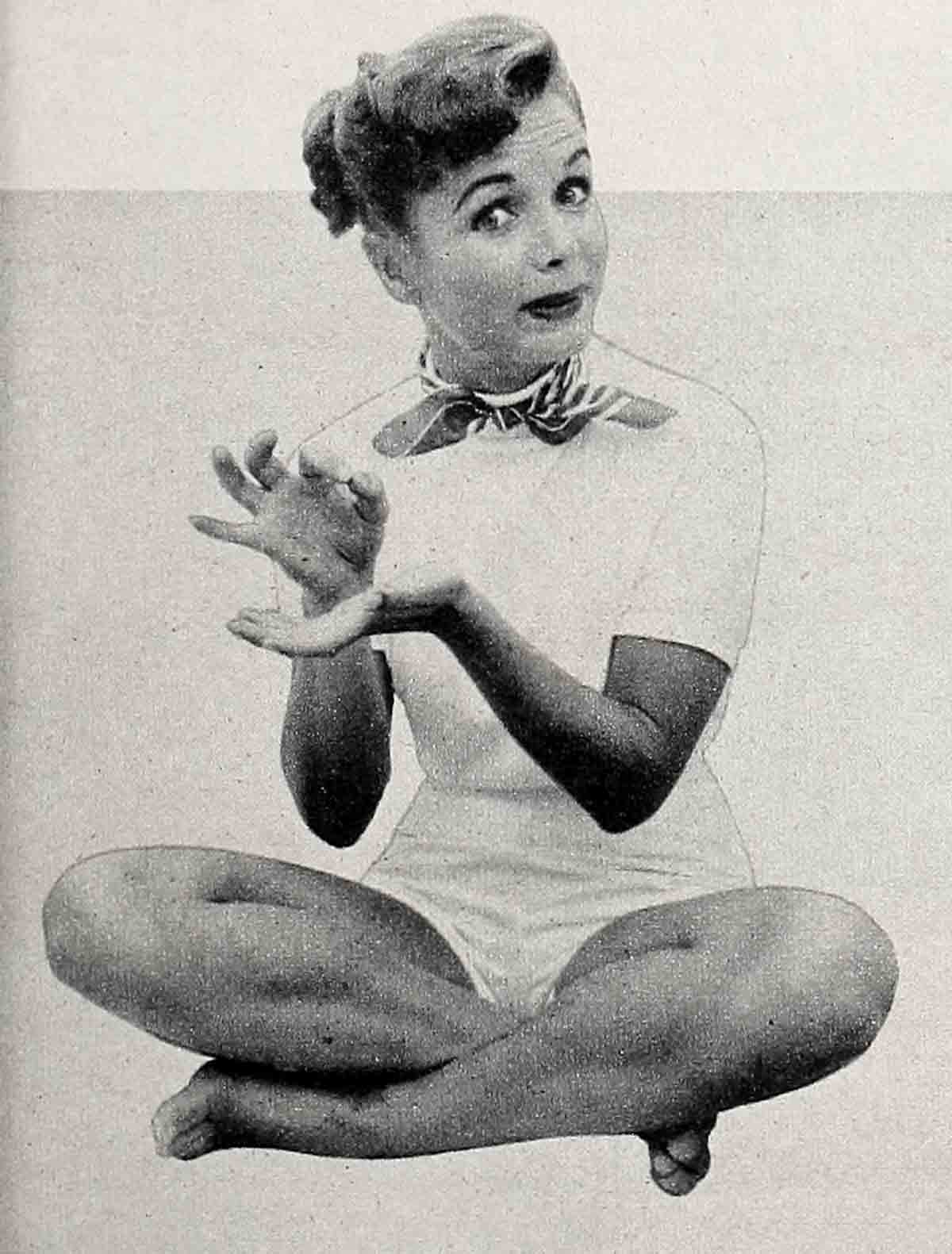
“What do you mean? I’m not talking like that.”
“Oh, yes you are. Talk to yourself in the mirror and see.”
She did. And she was. And she quickly brought herself back down to earth.
As far as her friends are concerned, she’s still the same old Mary Francis Reynolds who went to John Burroughs High in Burbank with them. When she goes out with them, which is often, she goes out their style. And. that usually means riding wherever they’re going on the streetcar.
She’s just as happy with her old high-school bunch as she is when she goes out with the movie crowd. “It’s a nice guy I want to spend the evening with,” she says, “not a big name.”
Of course, she hopes some day to fall in love and get married. But, so far, love is something that she hasn’t felt. A lot of people thought she was in love with Bob Wagner, but not Debbie herself.
“I went with him for two years,” she says. “Had a wonderful time. But it wasn’t love. If it had been, I would have been sure of it in that much time.”
And there’s nothing at all to the story that she was broken-hearted when she and Bob quit dating. “It was just that we suddenly both got very busy. We tried to arrange dates, but it just didn’t work out.
“Finally I said to him, ‘Look, why don’t we just not see each other for a while. We both have too much to do. And when we do see each other, we just argue. Let’s wait till we both have some free time.’
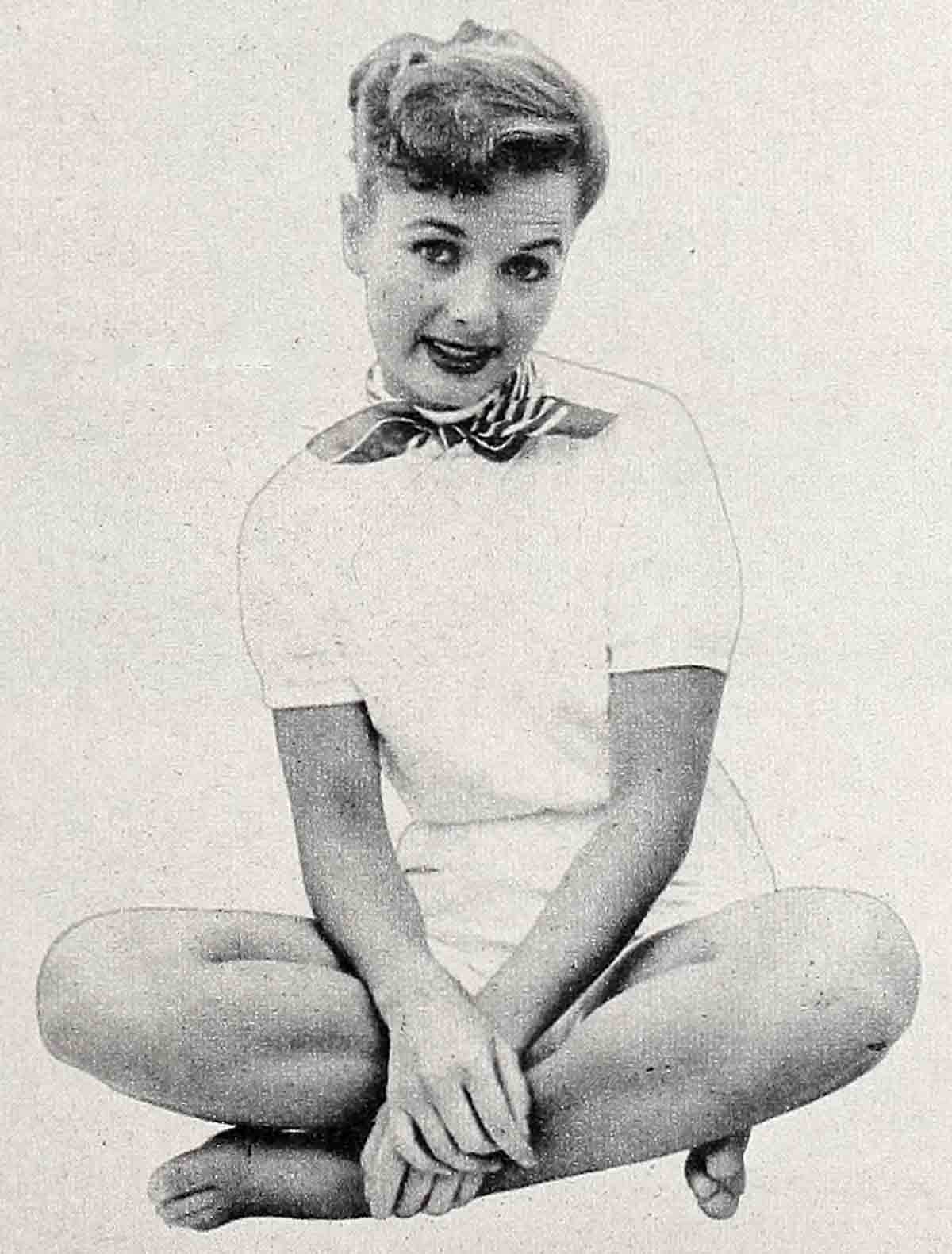
“Bob agreed. Then he started ‘Stars and Stripes Forever’ and he’s been dashing from one picture to the next ever since. I’ve been busy all the time too.”
But she admires him greatly, and she’s his stout defender against the recent barrage of critics who have been picking on him. For moral support, she mailed him some William Steig cartoons, those wry drawings with captions such as, “Public opinion no longer bothers me.”
Another of her movie dates is Tab Hunter, whom she’s been seeing off and on for four years. She frequently has dinner at his apartment and usually bakes a cake for dessert on those occasions.
“But marriage isn’t for me, yet,” she says. “At this stage of my life, my career is the most important thing.”
Her career has certainly been keeping her hopping.
During the past year, she went East, returned to do a picture, went to Korea, came back for another picture, went to Texas, to South America—and it’s that kind of pace most of the time.
No matter what the sharp guys say, Debbie’s own system of being herself seems to be working out just fine. In a mere four years in the movies, her career has moved steadily forward. And she’s had some wonderful luck. “Why,” says she, “I was handed that great role with Gene Kelly and Donald O’Connor in ‘Singin’ in the Rain’ before I even learned to sing and dance.”
Her services are in heavy demand by other studios. She was sought for the lead in “The Moon Is Blue,” but M-G-M turned it down, and Debbie’s been sorry ever since. The studio relented, though, and allowed her to make “Susan Slept Here” with Dan Dailey for an independent producer, Alex Gottlieb.
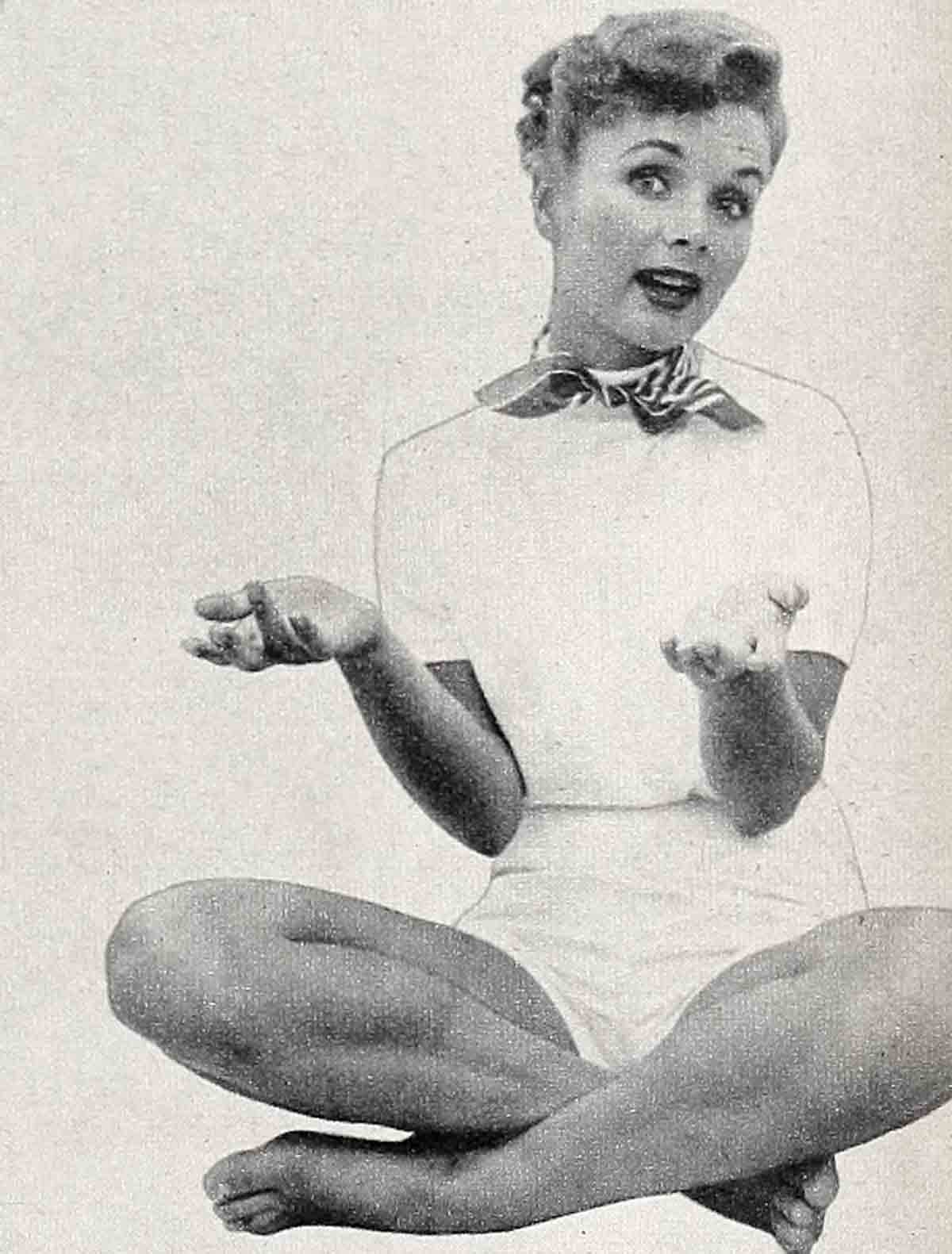
“I’ll admit Debbie goes against the trend,” a wise publicity man observed recently, “but this isn’t the first time that’s happened. A sweet little girl named Janet Gaynor was more popular than the flappers of her era. And while servicemen were whistling at the pinup girls of the ’40’s, they were busily writing letters to June Allyson.”
But there are some writers who, despite the proof, still can’t believe that sweet little Debbie can really be true. So what do they do? They make things up. Like one columnist who reported that on her twenty-first birthday, she celebrated by smoking too many cigarettes and passing out from too many drinks.
Debbie was furious. “I was at the Stork Club,” she said afterwards. “I was there with my mother and I ate peanuts and drank milk.”
Such falsehoods make Debbie angrier than anything else she can think of. “Why do they have to make up nasty stories?” she asks. “Why not print nice ones?”
Here’s the kind of story she means:
Recently, Debbie volunteered to be a counselor at a Girl Scout summer camp. She had a wonderful time, and the kids loved her. Two of her teenage campers confessed to her that they had painful crushes. One was wild about Tab Hunter and the other was mad for Bob Wagner.
When Debbie got back from camp, she invited ali the girls to her house one Sunday afternoon and told them she had a surprise for them. She had asked Tab and Bob to drop in. Bob couldn’t make it, because of some work on “Prince Valiant,” so he telephoned to say he was sorry. Debbie called the girl whose heartthrob he is to the phone. She was in such a daze that when she walked outside she promptly fell into the pool.
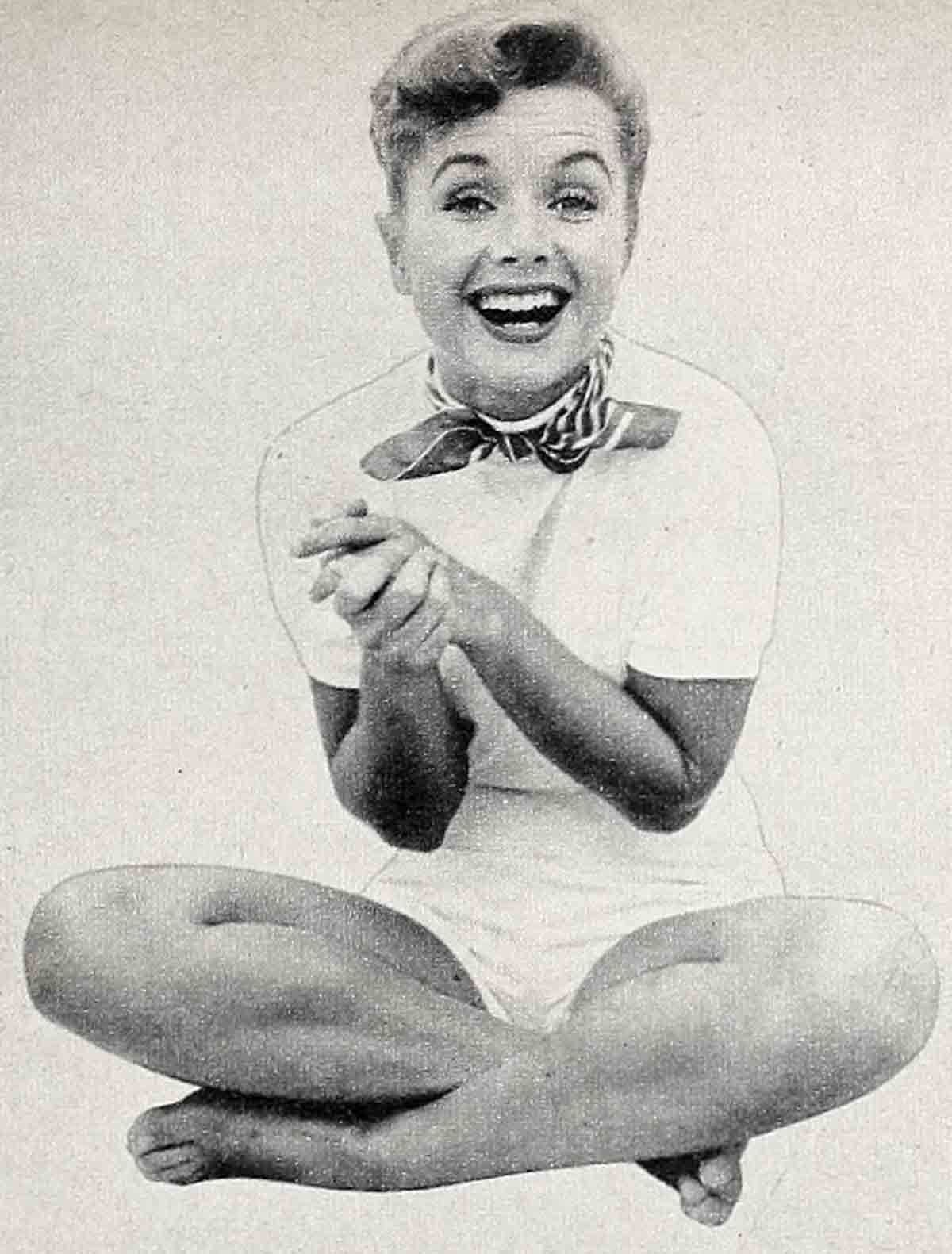
When Tab arrived, the other girl went into a flutter. She was so overwhelmed, she locked herself away and had to be coaxed out to meet her dreamboy.
This is the kind of life that Debbie leads, and she doesn’t care who knows it.
“I don’t want to be a glamour girl,” she says. “I’m just not the type. And if I tried, I’d be an awful flop at it.
“I would look silly being the heavy-lidded siren. The thing I want to do is comedy. I want to make people laugh and enjoy themselves. And I don’t see why I can’t do that and keep on being myself.”
So far, it seems to be working. She has had only one major career disappointment. She was all set to do “The Actress,” but at the last minute she was taken out and Jean Simmons was given the role instead.
But she didn’t let it get her down. She went right out and did the same role in summer stock, to prove she could do it.
So that’s what she was up to, when she might have been pleasing her critics by practicing slinky walks.
Maybe she’d be more successful—as an actress and a human being—if she were all done up in a clinging dress pouring cocktails out of a silver shaker on a penthouse terrace. And maybe not.
Debbie doesn’t think so. And, as a matter of fact, neither do we.
THE END
It is a quote. PHOTOPLAY MAGAZINE DECEMBER 1953




